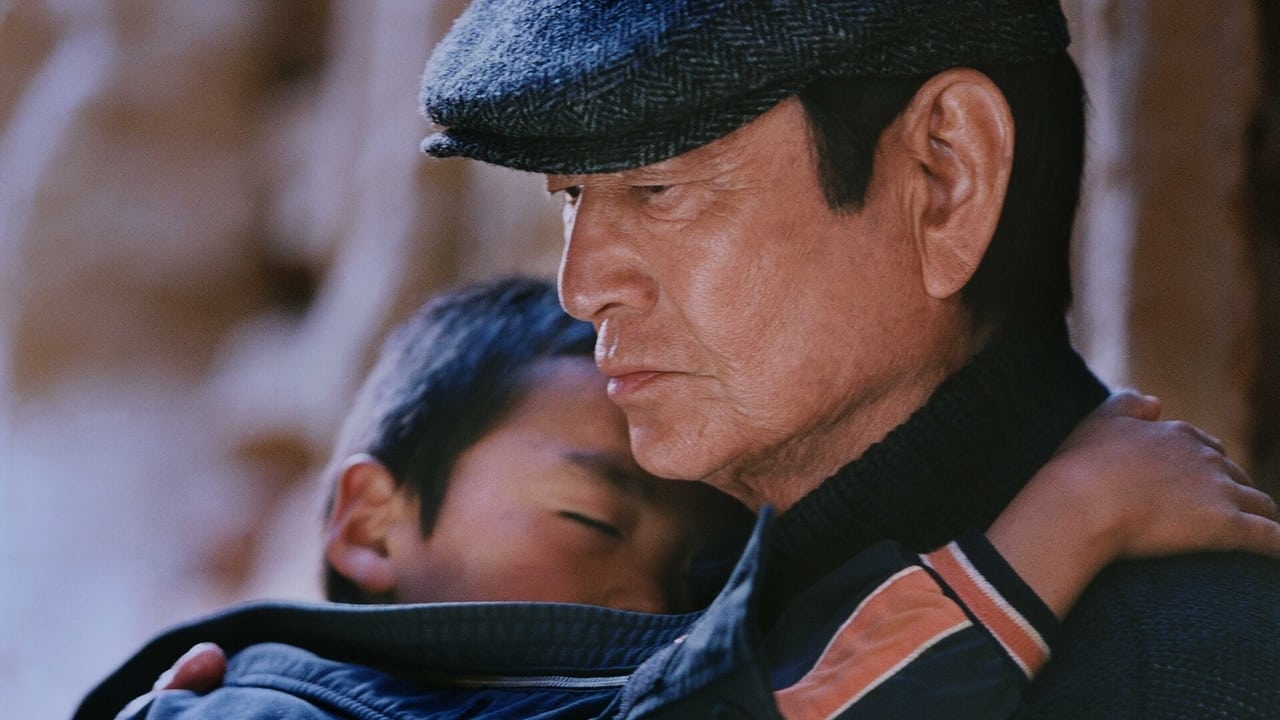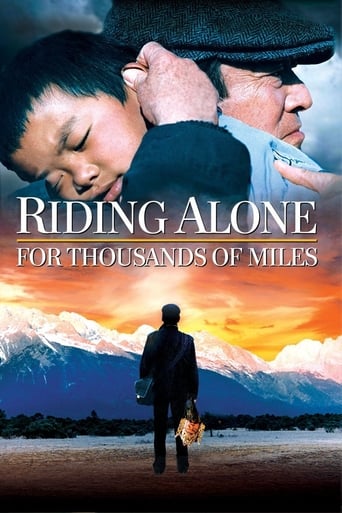

Riding Alone for Thousands of Miles is a lovely tale about a father who, knowing nothing about his son's adult life-aside form the fact that he is dying-decides to finish what he thinks his son has started with the utmost care and desire to complete. The film speaks about what people will do to regain the love they lost and how the journey is almost more precious than the destination.Mr. Takata leaves his life in Japan to see his estranged son who is has liver cancer and is dying. when he arrives at the hospital, he is coldly rebuffed bye his son. His daughter in law, Rie, gives him a tape that his son, Ken-ichi, made. With the tape he discovers that his son has a passion for Chinese folk opera and impulsively resolves to travel to china to film ''riding alone for thousands of miles'' for his son. It is interesting that Yimou never shows Ken-ichi, and it is necessary to give the audience the same feeling of longing that Mr. Takata feels, the same feeling of distance and separation. Also, refraining from free-flowing emotions evokes the strict composure of Japanese culture.Upon traveling to china to finish the video, Ken-ichi's father discovers that he is not the only man who has an imperfect relationship with his son. His journey takes him outside of his shell and into another world. After his wife died, he escaped by disappearing from his son's life and what he knew to be his own. By connecting another father and son he, in a way, heals himself.Much like life, the film is funny and endearing, although gloomy and depressing at times. I liked watching this movie because I felt relaxed and drawn into the story. The scenes where Mr. Takata is staring out into the ocean especially calm me. The rhythm of those scenes coupled with the sound of the beach gave me a the feeling of being there. I like the that the title is the title of the play that Mr. Takata journeys to capture. The plot of the play reflects his own situation because he also travels alone for thousands of miles to help someone (really himself more than his son). I recommend this film to those who enjoy subtlety in story-telling.
... View MoreRiding Alone for Thousands of Miles is a film that illustrates the agony that a father experiences when he tries to reunite with his dying son. Ken Takakura, who played the father, is an emotionally reserved Japanese man who, in order to express his love for his dying son, travels to China from Japan to film a song and dance performance by Li Jianima, an ancient musical artist. Yahoo Zhang, the director,conveys the will and dedication of the father as he travels a long distance to carry out his son's dying wish of capturing Li Jianima on tape. The father has difficulty capturing this artist on tape when he receives news that Li Jianima is in prison. The father wins the audience over with his profound acting that illustrates the devotion and commitment he possesses for his son. Through the use of color, Zhang captures the essence of the two contrasting cultures, Japan and China. Zhang uses soft blue and steel colors to show the sophisticated and modern culture of Japan. In contrast, Zhang provides the audience with bright vivid red and yellow colors to express the liveliness and traditional behaviors of the Chinese culture.
... View MoreThis is a beautiful film about a father's quest to redeem himself in his son's eyes, and gain his forgiveness. What is curious, yet touching about this film is how the father's journey for his son, turns into a journey for himself. At the beginning the father, Takata states that he is bad with people, yet if he wishes to finish the film for his son, he must interact with many different people who are not only of a different culture, but who do not speak the same language.Takata sees himself and his own son in the imprisoned opera singer, it is because of this that he tries to bring Yang Yang to see his father. Also, upon seeing how Yang Yang has no father figure in his life, Takata soon builds a close relationship with him, much like a father son relationship. This relationship shows Takata that he is very capable of emotions, and no longer needs to lock away his feelings.
... View MoreRiding Alone for a Thousand Miles is a very touching movie that depicts the journey of a man in the pursuit of forgiveness and redemption from past actions. The main character is the father of a dying son with whom he had had a distant paternal relationship. Takata, the father gets a phone call that breaks right into the loneliness bubble he had put himself into after his wife passed away. His life changes drastically when he realizes he is about to lose his own son for whom he had done so little in life.An important role is played by Takata's daughter in law, who calls him and requests his presence for his son is about to die. The son had some major resentment about his absence after the death of his mom and does not want to see him. Now all Takata has is a tape with his son's documentary about Chinese folk operas. In it, he expresses his will to return the next year and film it again, which is the key for Takata to a whole new world of self acknowledgment in his journey to earn his son's forgiveness. On this trip to China Takata faces the biggest barrier to his objective, the gateway to his true feelings. The theme of the masks in the movie also refers to the masks used in the characters daily lives where the most beautiful or painful feelings have to be hidden behind appearances. The difference between the Chinese and the Japanese environments is another remarkable element. Director Yimoy manipulated these differences very well to express the coldness of the masquerade feelings as opposed to the colorful open-heartedness of letting one's feelings out. Takata's main objective turns into something bigger and even nobler as the story develops. Without speaking a word in Chinese, he gets people to help him try and shoot the same Chinese folk opera singer his son had filmed, whom was in jail. As he comes to understand that filming in jail is not something easy/likely to happen he faces the need to share his own story with random people for them to understand his noble intentions and help him out. He keeps his humility around the only people who can help him get forgiveness from his son. The more help he gets, the more he knows about himself and about his son, something he had never looked into ever before. In his journey Takata learns more about the imprisoned singer and how he had never seen his own son. Takata thinks about how he wishes he had a closer relationship with his own son and tries to bring Yang Yang to meet his dad in jail. As it turns out that the boy does not have anyone to play the whole of a real parent in his life, Takata faces an opportunity to bond in a paternal relationship with him. That does not last long but it became a life lesson for this man who finally proved to himself that he can be a loving person and does not need to hide his feelings behind a mask.The filming became less important as he started bonding with human beings that were nice and helped him for no reason. The whole effort he put into trying to get forgiveness from is son is what made his actions noble and even though he did not get back in time to see his son, he got a forgiving letter that meant the complete release of the guiltiness he had carried in his heart for a long time.
... View More